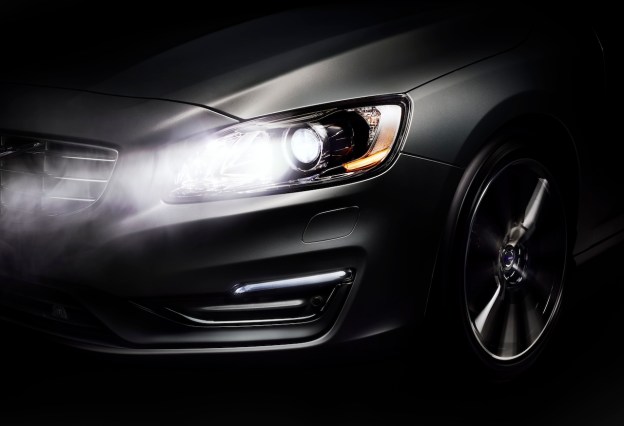
Volvo has built a stellar reputation for being obsessed with safety. Volvo engineers and designers realize the safest way for drivers to navigate roadways at night is with the brightest possible lights. So the Swedish automaker set to work figuring a way to allow drivers to keep the high-beam headlights on as often as possible without blinding or “dazzling” other drivers – as Volvo puts it. Keeping the high beams on all the time illuminates otherwise unseen road hazards such as parked cars, pedestrians, and animals.
Using a forward-facing video camera mounted into the space in front of the rearview mirror (at the top of the windshield), which is used for other safety systems such as auto brake, Active High Beam Control watches for oncoming vehicles and those directly ahead in the same lane.
When another vehicle is detected, the system turns a tiny cylinder fitted with metal fins inside the headlight unit, blocking out just the right amount of light. Volvo says the system is accurate up to a 1.5-degree margin.
Just last week we reported on a similar technology – among many others – from Audi. Unlike Audi’s matrix headlights, though, Volvo’s doesn’t involve the intricate fading in and out of LEDs but rather the refocusing of Xenon beams. Just like Audi’s matrix headlight system, however, Volvo’s Active High Beam Control is not currently legal in the U.S. market. We reached out to Volvo and a company representative told us that the system is currently held up due to “legislative restrictions.” So until regulators update or reinterpret decades old headlight laws we won’t be seeing Active High Beam Control on American shores.
International buyers interested in the Active High Beam Control are in luck, though, and will be able to find the feature on new S60 and XC60 models starting in spring 2013.
At the end of its press release, Volvo hinted it would also be unveiling a brand-new safety technology at next week’s Geneva Motor Show. When we know what that exciting new safety feature will be, we’ll be sure to report on it.


